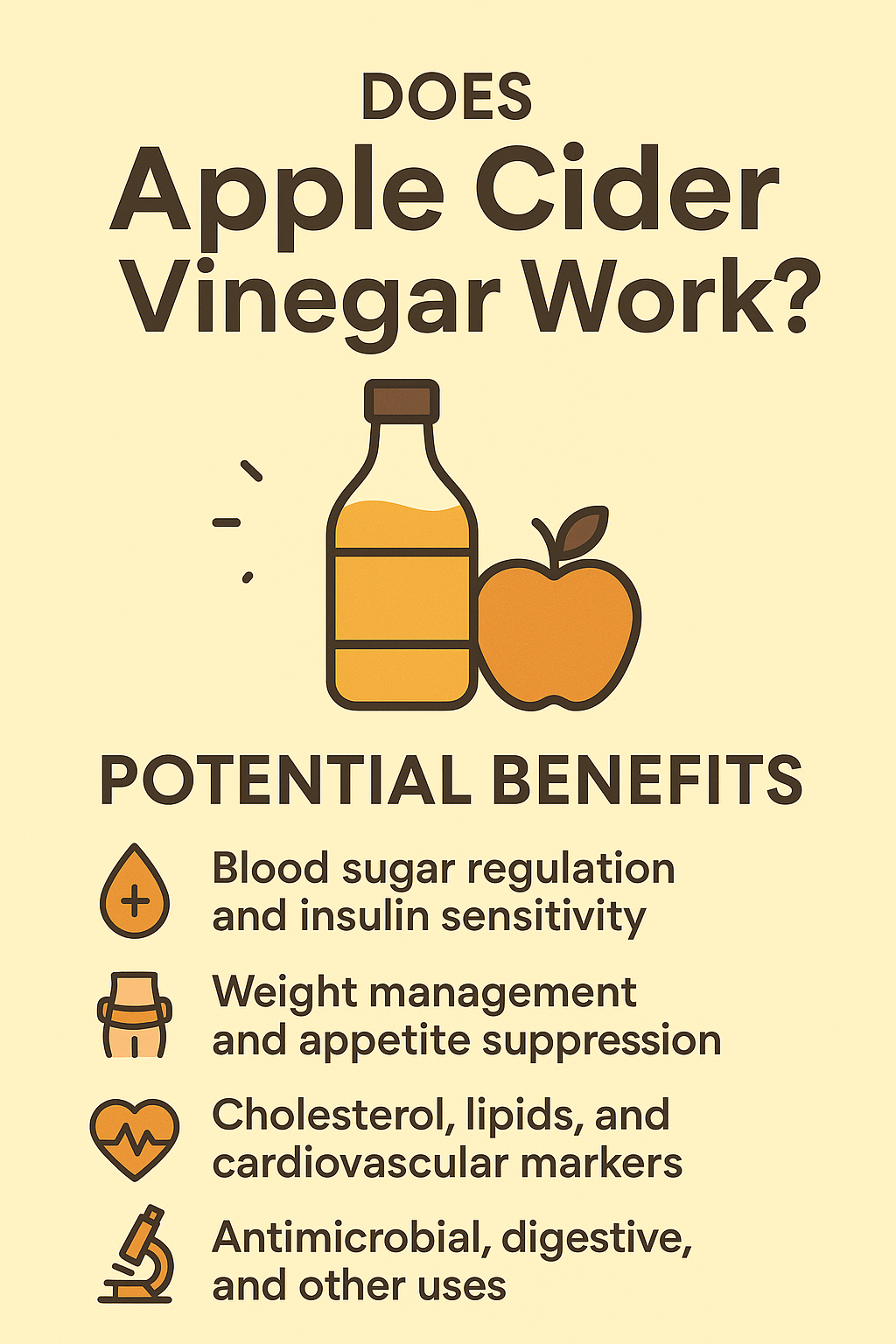
Does apple cider vinegar work for health and wellness? Explore the pros and cons of apple cider vinegar use, evidence, risks, and practical guidance.
Does Apple Cider Vinegar work?
You’ll find a flood of claims: “boosts weight loss,” “balances blood sugar,” “detoxifies,” and more. Let’s look into these claims.
What is apple cider vinegar?
Apple cider vinegar is made by fermenting crushed apples with yeast and bacteria; sugar turns to alcohol, which is then converted into acetic acid. Many commercial bottles also contain “the mother”—a cloudy mix of beneficial bacteria and enzymes believed to enhance it’s health value.
Because Apple cider vinegar is acidic (mostly acetic acid), many of its proposed effects (good or bad) stem from that acidity.
Why people believe it works: proposed benefits
Here are some of the commonly claimed benefits and what the evidence suggests:
Blood sugar regulation and insulin sensitivity
One of the better-supported uses is in moderating blood sugar levels. Some small trials show that ingesting Apple cider vinegar with or before a high-carb meal can reduce post-meal blood glucose rises, likely because the acetic acid slows digestion and starch absorption.
Weight management and appetite suppression
Some proponents claim Apple cider vinegar helps with weight loss by increasing fullness, suppressing appetite, or altering metabolism. Indeed, a few human studies (often 8–12 weeks) found small reductions in weight, BMI, or waist circumference when Apple cider vinegar was combined with a calorie-restricted diet versus diet alone.
Cholesterol, lipids, and cardiovascular markers
Some animal and human studies hint that Apple cider vinegar may reduce total cholesterol, LDL cholesterol (the “bad” kind), and triglycerides, while boosting HDL (“good”) cholesterol.
Antimicrobial, digestive, and other uses
Because Apple cider vinegar is acidic, it has been shown in some lab studies to kill certain bacteria (e.g. E. coli, Staph aureus) in vitro.
Unproven uses include skin or hair tonics, detoxification claims, or fungal treatments. There is almost no good human evidence supporting such uses.
Pros of using apple cider vinegar
Here’s a summary of what potential upsides are plausible:
- Modest blood sugar modulation: Especially when taken with starchy meals, Apple cider vinegar may reduce glucose spikes.
- Small weight-related benefit: It may help suppress appetite or slightly boost fullness, aiding modest calorie control.
- Possible lipid improvement: Some evidence points to small improvements in cholesterol or triglycerides.
- Antimicrobial properties (in vitro): Might help inhibit certain bacteria outside the body (though ingesting Apple cider vinegar is not the same).
- Low cost and availability: It’s inexpensive, easy to find, and already used as a food ingredient.
- Generally safe in small diluted amounts: Many people tolerate one to two tablespoons diluted in water daily without serious issues.
These are “possible” benefits—not guaranteed miracles.
Cons, risks, and limitations
Using apple cider vinegar is not without downsides. Here are the main concerns:
Because of its acidity, undiluted Apple cider vinegar could erode tooth enamel or irritate the throat and esophagus.
Even diluted Apple cider vinegar should be consumed via straw or rinsed away afterward to protect teeth.
Gastrointestinal discomfort and delayed digestion
Some users report nausea, bloating, or slowed digestion. In some conditions like gastroparesis, Apple cider vinegar may worsen symptoms.
Low potassium and bone health concerns
High-dose or long-term use has been associated (in case reports) with hypokalemia (low potassium), which can affect heart and muscle function.
Interactions with medications
Apple cider vinegar may interact with some medications, notably diuretics (“water pills”), insulin or diabetic drugs, and digoxin, as Apple cider vinegar’s influence on potassium or pH might magnify drug effects.
If you have kidney disease, low potassium, or are on these drugs always consult your physician before using Apple cider vinegar as a supplement.
Overhyped or exaggerated marketing
Claims of dramatic “detox” effects, curing disease, or massive weight loss are not credible. Some such claims directly contradict the limited scientific evidence. Apple cider vinegar should not replace medications or professional medical advice.
Practical tips and guidelines for use
If you want to try apple cider vinegar safely, here are some reasonable recommendations:
- Use diluted amounts. A common dose used in studies is 1 to 2 tablespoons (15–30 ml) in a large glass of water, taken before or with meals.
- Never drink it straight. Always dilute to minimize damage to teeth and throat.
- Use with straw. Drinking via straw can reduce contact with teeth.
- Rinse afterward. Rinsing your mouth with water after consuming Apple cider vinegar can help protect your enamel.
- Begin slowly. Start with smaller amounts to see how your body responds.
- Don’t view it as a magic solution. Use Apple cider vinegar as one small adjunct in a broader healthy diet, exercise, and medical plan.
- Consult your health professional. Especially if you have diabetes, kidney disease, low potassium, or take medications like diuretics.
- Stop if adverse effects appear. Whether throat pain, tooth sensitivity, digestive upset, or muscle cramps.
So, Does Apple Cider Vinegar work?
Yes, but modestly—and only in restricted contexts. Apple cider vinegar is not a universal cure, but may support mild improvements in blood sugar control, appetite suppression, and lipid profiles for some individuals, particularly when paired with diet and lifestyle changes. However, its benefits are small, and overhyping it is unwise.
In practice, use it cautiously and don’t expect overnight miracles. Always treat it as a minor supplement or condiment, not a replacement for evidence-based therapies or healthy habits.

This article is for informational purposes only. This article is not, nor is it intended to be, a substitute for professional medical advice, diagnosis, or treatment and should never be relied upon for specific medical advice. This article is the view of the expert and does not necessarily represent the view of Little Beauty Blog.
